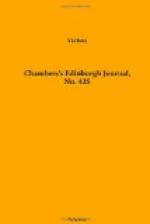We commence with an assertion which will startle many—namely, that Dibdin’s songs never were, are not, and never can be, popular with sailors. About six years ago—if we recollect rightly as to date—the Lords of the Admiralty, considering that Dibdin’s songs had always been ‘worth a dozen pressgangs,’ as the common saying is, ordered that twenty of the best songs should be printed on strong paper, and presented to every man and boy in the royal navy. This act, however, is not so much to be regarded as a strong evidence of the private opinion of the nautical magnates in question—but the chief of them is invariably a landsman—as of their deference to the force of public estimation on the subject of the songs. Let it not be thought, from the tenor of our subsequent remarks, that we ourselves are at all prejudiced against Dibdin. So far is it the reverse, that we were brought up from childhood ‘in belief’ of that gifted lyrist: our father repeated to us in early life his finest songs, and we have never ceased to regard him with sincere admiration. He was a man of true genius in his peculiar walk, and it has been well and truly said of him, that, ’had he written merely to amuse, his reputation would have been great; but it stands the higher, because his writings always advocate the cause of virtue: charity, humanity, constancy, love of country, and courage, are the subjects of his song and of his praise.’
Dibdin himself was not a sailor, and his knowledge of sea-life, of seamen, and of sea-slang, is generally attributed to the instructions of his brother, the master of a ship. This brother was subsequently lost at sea, and Dibdin is said to have written Poor Tom Bowling as his elegy. Dibdin’s sea-lore was, therefore, altogether second-hand and theoretical; and his songs, on the whole, present an idealised and exaggerated embodiment of the characteristics, life, and habits of seamen; but it is wonderful how accurately and skilfully he introduces allusions to sea-man[oe]uvres, and how very rarely he errs in nautical technicalities. They were written in war-time, when the nation was excited to a pitch of frenzied enthusiasm by a succession of unparalleled naval victories—when a prince of the blood trod the quarter-deck, and Nelson was ‘Britannia’s god of war.’ Their popularity with landsmen was then incredible. Everybody sang Dibdin’s sea-songs, deeming them a perfect mirror of sea-life and seamen’s character. The truth is, he has exaggerated both the virtues and the follies of sailors to an absurd degree; and his blue-jacketed heroes are no more to be accepted as a fair type of sailors, than are Fenimore Cooper’s Chingachgook and Leatherstocking as types of the Red Men and trappers of North America. Herein, we conceive, is the primary cause of Dibdin failing to enlist strongly the sympathies of real blue-water tars; and the very same reason, with some modifications, prevents all prose works, descriptive of sea-life,




